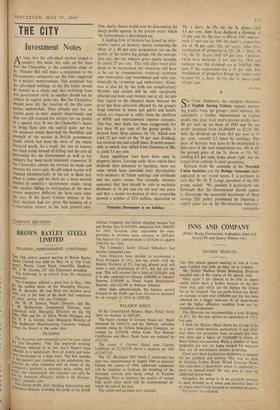THE CITY .
Investment Notes
T long last the gilt-edged market staged a recovery this week, but only on the hope that the Chancellor in the committee stage of thi Finance Bill will make a concession to the life-assurance companies on the lines suggested by a market memorandum. This proposed that the gilt-edged holdings of the life funds should be treated as a whole and that switching from one government stock to another should not be subject to capital gains tax. But the Chancellor should have left the taxation of the life com- panies undisturbed. They already pay tax on capital gains in their annuity departments and they are still assessed for income tax on profits in a special way. It was the Chancellor's desire to bring them into the capital gains net for tax purposes which destroyed the flexibility and strength of the market in British government bonds which had been the envy of the whole financial world. As a result, the rate of interest has been rising instead of falling and the cost of borrowing for the Government as well as for Industry has been made hideously expensive. If the Chancellor admits the mistake he made and restores the status quo, the gilt-edged market will respond wholeheartedly to the cut in Bank rate When it comes and we shall see a more normal market in securities —government stocks rising and equities falling m anticipation of the most severe monetary deflation we have seen since the war. If the heavy Labour defeats in the local elections had not given the promise of a ( onservative victory in the next general clec-
tion, equity shares would now be discounting the sharp profits squeeze in the private sector which the Government is determined on.
A leading firm of brokers has issued an infor- mative report on brewery shares, estimating the effect of a 40 per cent corporation tax on the profits of the twelve big groups. On the average, they say, the tax reduces gross equity earnings by about 25 per cent. This will allow most divi- dends to be maintained, but retentions will have to be cut by CHARRINOTON, COURAGE, SCOTTISH AND NEWCASTLE and WHITBREAD and very sub- stantially by GUINNESS and THRELFALLS. (Guin- ness is also hit by the Irish tax complication.) WATNEY and ALLIED will be only marginally affected and BASS and TRUMAN not at all. ALLIED they regard as the cheapest share, because the price has been adversely affected by the group's large interests in wines and spirits and hotels, which are expected to suffer from the abolition of RPM and entertainment expense accounts. This fear, they think, has been exaggerated, for less than 10 per cent of the group profits is derived from these sources. At 13s. Allied now yield 51 per cent on the 14 per cent dividend, last covered one and a half times. It seems reason- able to switch into Allied from Guinness at 20s. to yield 5.1 per cent.
Some significant rises have been seen in property shares. Leaving aside those which have declared their intention to liquidate, there are some which have provided their shareholders with estimates of future earnings and dividends and net assets values. For example. ARNDALE announce that they should be able to maintain dividends at 16 per cent for the next two years and that a recent revaluation of their properties showed a surplus of £7.4 million, equivalent to 30s. a share. At 17s. 6d. the 5s, shares yield 4.4 per cent. IMRY have declared a dividend of II per cent for the year to March 1965 and esti- mate 13 per cent for 1967-68 under a corporation tax of 40 per cent. The net assets value after revaluation of properties is 21s. 2d. a share. At I Is. the 5s. shares yield 4.9 per cent. CH ESTER- IELD have declared 11 per cent for 1964 and estimate that this dividend can be held for 1966 even if the corporation tax is 45 per cent. The revaluation of properties brings net assets value to over 15s. a share. At 11 s. the 5s. shares yield 4.9 per cent.
CI : S TOS SIR CYRIL HARRISON, the energetic chairman of English Sewing Cotton, expects increas- ing profits from the group's retail interests. He anticipates a further improvement in trading profits this year. Last year's pre-tax profits were 40 per cent up on those of 1963 and the net profit increased from £1,444,869 to £2,18'%.206, with the dividend up from 10.1 per cent to 15 per cent, covered 2.2 times by earnings. This pace of increase may have to be maintained to take care of the new corporation tax. All in all, the present price of the 5s. shares at 11 s. 9d., yielding 6.3 per cent, looks about right, but the longer-term outlook is most promising.
Extracts from the accounts of the Norwich Union Societies and the Refuge Assurance have appeared in our recent issues. It is pertinent to note that Mr. D. E. Lange, president of the NU group, stated: 'We consider it, particularly un- fortunate that the Government should appear to discourage the successful investment of these savings [life policy premiums] by imposing a capital gains tax on the life-insurance industry.'
LOTI !BURY LOTI !BURY






























 Previous page
Previous page